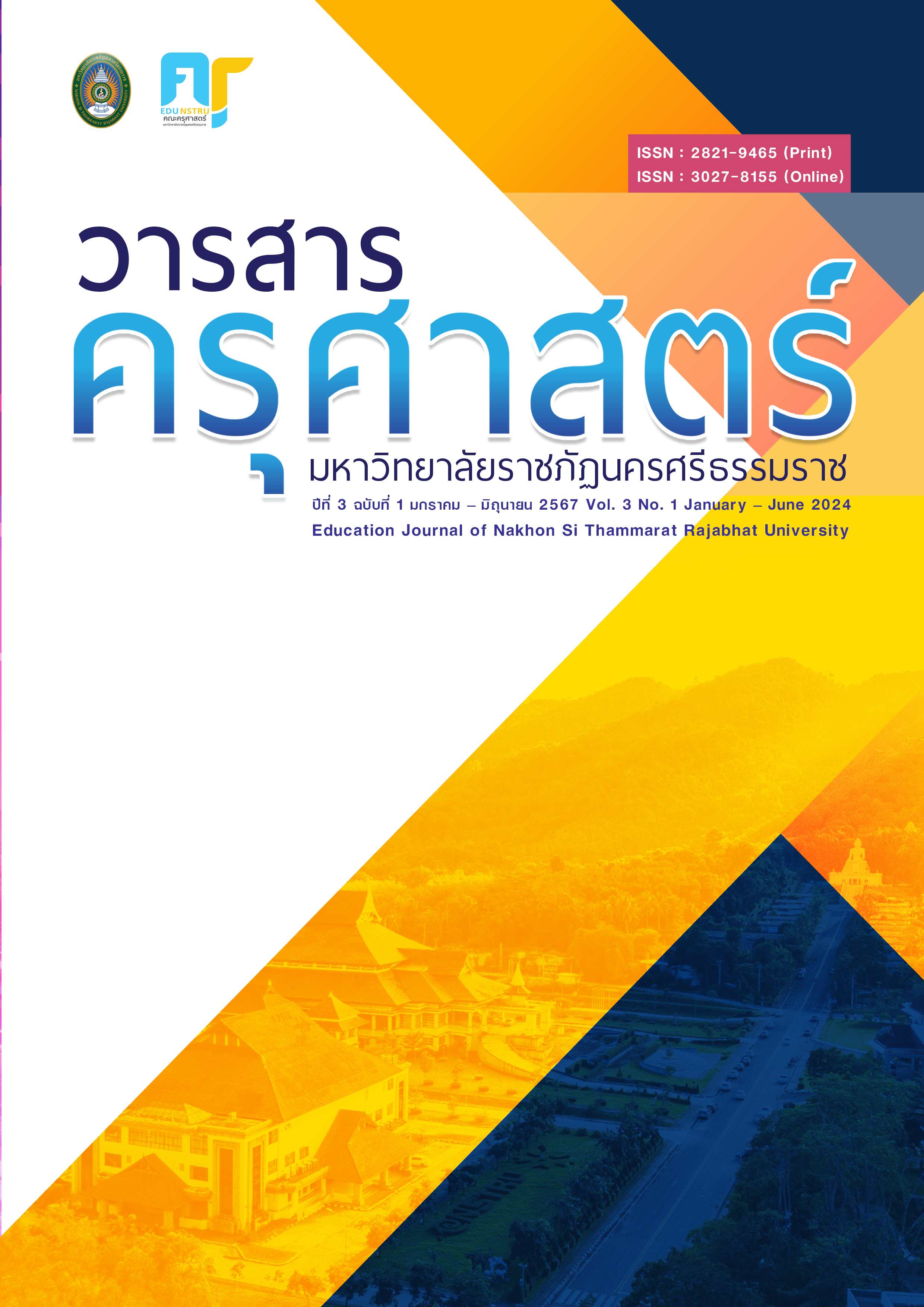Development of Learning Outcomes in Social Studies and Analytical Thinking Using Simulation Learning and the Tiktok Application on the Duties of Youth towards Society and the Nation. of Mathayom 1 Students at Yothinbamrung School
Main Article Content
Abstract
Development of learning outcomes in social studies and analytical thinking Using simulation learning and the TikTok application on the topic of youth's duties to society and the nation. Of Mathayom 1 students at Yothinbamrung School. It is experimental research. With the objective of 1) compare the learning results of students before and after receiving learning simulations and the TikTok application. 2) Study the analytical thinking of students, and 3) Study the satisfaction of students with the learning management. The sample group was Mathayom 1 students at Yothinbamrung School. Nakhon Si Thammarat Province, Semester 1, academic year 2023, by Cluster Random Sampling, 1 classroom, 28 students. Research tools are plans, tests and analytical measures. And satisfaction measurement in learning management Statistics used in data analysis are mean, standard deviation, and t-test Dependent.
The results found that the students had 1) higher learning outcomes after studying (= 12.42, S.D. = 0.74) than before studying (
= 7.50, S.D. = 1.85) with statistical significance. Level .01 2) Analytical thinking results has an average score of 3.95, at a good level; and
3) satisfaction with learning management has an average score of 4.25, at the highest level.
Article Details

This work is licensed under a Creative Commons Attribution-NonCommercial-NoDerivatives 4.0 International License.
บทความที่ได้รับการตีพิมพ์เป็นลิขสิทธิ์ของวารสารครุศาตร์ มหาวิทยาลัยราชภัฏนครศรีธรราช
ข้อความที่ปรากฏในบทความแต่ละเรื่องในวารสารวิชาการเล่มนี้เป็นความคิดเห็นส่วนตัวของผู้เขียนแต่ละท่านไม่เกี่ยวข้องกับวารสารครุศาสตร์ มหาวิทยาลัยราชภัฏนครศรีธรรมราช
References
Khaemmanee, T. (2023). The science of teaching knowledge for effective learning process management. (26th ed). Bangkok: Chulalongkorn University Publishing. (in Thai)
Mano, K., Satiman, A., Jareanjittakom. S. & Boonlue., S. (2021). The development of application for education by with kwl plus technique on readingfor main idea, thai language subject to enhance analytical reading ability for prathomsuksa 3 elementary school students. Journal of Education Silpakorn University, 19(1), 68-88. Retrieved from https://so02.tci-thaijo.org/index.php/suedujournal/article/view/245068 (in Thai)
Pooltawee, T., & Tantichuwet, P. (2021). The Development of Learning Achievement and Satisfaction through Inquiry-based Learning (5E) combined with Refraction Simulation for Grade 9th Students. Journal of Education and Human Development Sciences, 2(5), 52-65. Retrieved from https://kuojs.lib.ku.ac.th/index.php/jehds/article/view/4623/2228 (in Thai)
Thongkum, N. (2019). Participating the Instructional Innovative Inventories with the Simulation Based Learning and Application for Education Methods for Developing Students' Learning Achievements at the 11th Grade on Light and Telescope Issue in Physics Class (Master of Education (Science Education)). Rajabhat Maha Sarakham University. Retrieved from https://fulltext.rmu.ac.th/fulltext/2562/M126859/Thongkam%20Nawapon.pdf (in Thai)
Likert, R. (1987). The Method of Constructing and Attitude Scale. New York: Wiley& Son. Retrieved from https://www.sfu.ca/~palys/Likert-1933-TheMethodOfConstructingAnAttitudeScale.pdf
Thongphuak, P. (2018). Effects of economics instruction by using simulation games on financial literacy of upper secondary school students (Doctor of Education), Bangkok: Chulalongkorn University. Retrieved from https://cuir.car.chula.ac.th/handle/123456789/61393 (in Thai)


